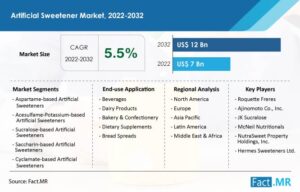The global artificial sweetener market has witnessed remarkable growth in recent years, driven by rising health consciousness, increasing prevalence of lifestyle-related diseases, and the demand for sugar substitutes in various food and beverage products. Artificial sweeteners, often used as sugar alternatives, offer reduced calorie options without compromising on taste. This article delves into the current trends, health concerns, and future prospects of the artificial sweetener market, providing valuable insights for research and analysis in this dynamic industry.
For More insights into the, Request a Sample of this Report:
Trends Shaping the Artificial Sweetener Market:
Health-Conscious Consumer Base: As more consumers prioritize healthier lifestyles, the demand for low-calorie and sugar-free alternatives has surged. Artificial sweeteners offer a viable option for individuals looking to reduce their sugar intake without sacrificing taste.
Rise in Diabetic Population: The increasing prevalence of diabetes has propelled the demand for artificial sweeteners, as they allow diabetic individuals to enjoy sweet flavors without affecting their blood sugar levels.
Growing Demand for Processed Foods and Beverages: The popularity of convenience foods and beverages has led to a higher incorporation of artificial sweeteners in products such as diet sodas, sugar-free snacks, and low-calorie desserts.
Product Innovation and Diversification: Manufacturers are investing in research and development to create new and improved artificial sweeteners that closely mimic the taste of sugar. This trend aims to address concerns about aftertastes associated with some existing sweeteners.
Health Concerns and Controversies:
Safety and Regulatory Scrutiny: Despite their widespread use, artificial sweeteners have faced scrutiny regarding their safety. Regulatory agencies worldwide continue to evaluate and set acceptable daily intake levels for various sweeteners to ensure consumer protection.
Perceived Negative Health Effects: Some studies have raised concerns about potential adverse health effects of certain artificial sweeteners, including links to metabolic disorders and gut health. However, conclusive evidence is still lacking, and more research is needed.
Impact on Taste Preferences: Prolonged consumption of artificial sweeteners may influence taste preferences, potentially leading to an increased preference for sweet flavors and affecting overall dietary choices.
Future Prospects of the Artificial Sweetener Market:
Advancements in Sweetener Technology: Ongoing research and technological advancements are likely to result in the development of novel artificial sweeteners with improved taste profiles and minimal aftertastes, addressing some of the current concerns.
Expanding Application in Functional Foods: The integration of artificial sweeteners in functional foods and dietary supplements presents a promising avenue for market growth. These products cater to health-conscious consumers seeking added nutritional benefits.
Rise of Natural and Plant-Based Alternatives: The trend towards natural and plant-based ingredients is also impacting the artificial sweetener market. Consumers are seeking alternatives derived from natural sources, such as stevia, monk fruit, and erythritol.
Global Market Penetration: Emerging economies present significant growth opportunities for artificial sweetener manufacturers as disposable incomes rise and dietary preferences evolve.
The artificial sweetener market continues to evolve in response to shifting consumer preferences, health concerns, and advancements in food technology. While challenges regarding safety and health effects persist, ongoing research and innovation are paving the way for improved products that cater to diverse consumer needs. As the market expands its reach into various industries and regions, understanding these trends and concerns is essential for researchers and industry stakeholders seeking to navigate the dynamic landscape of artificial sweeteners.
